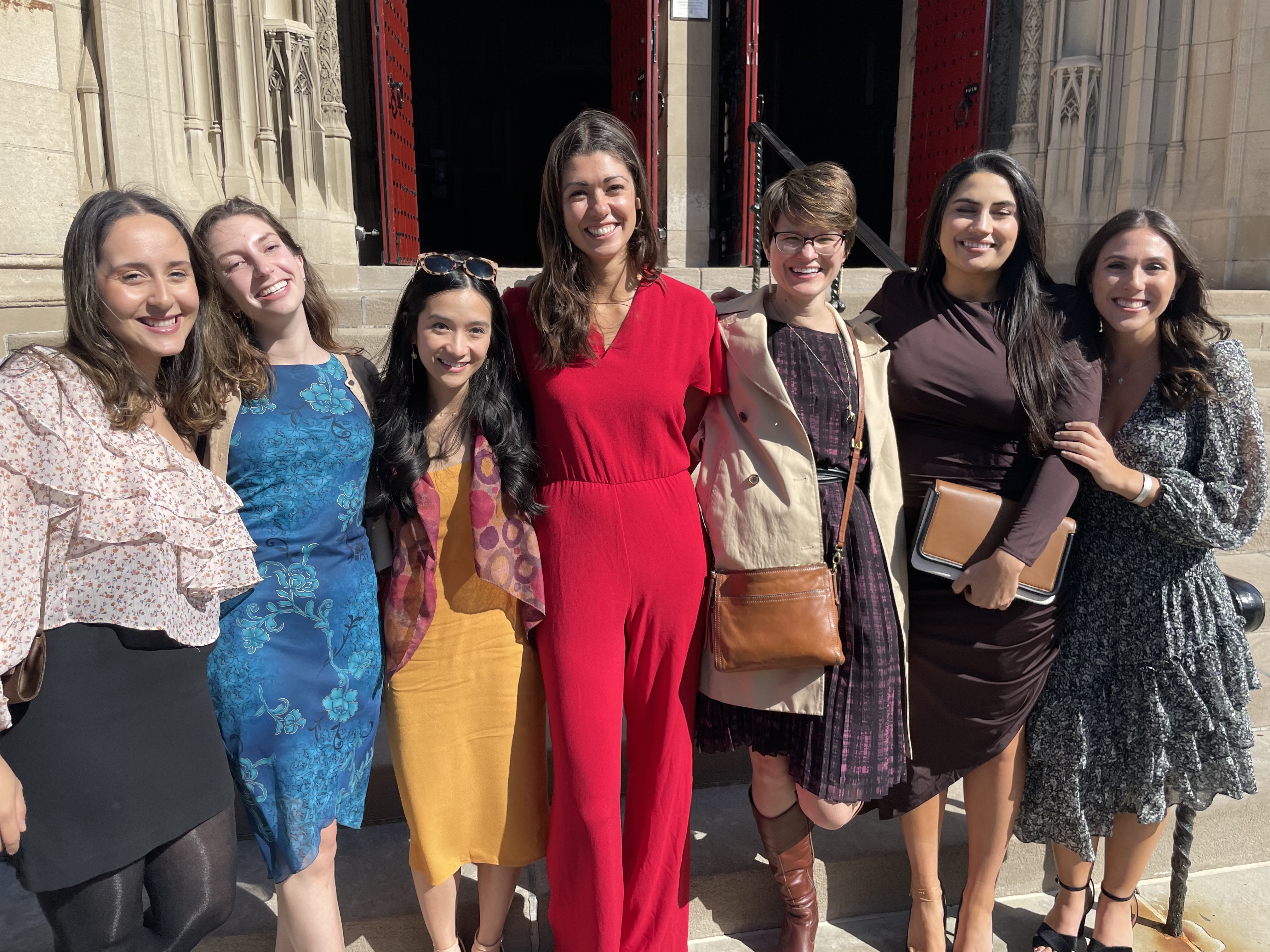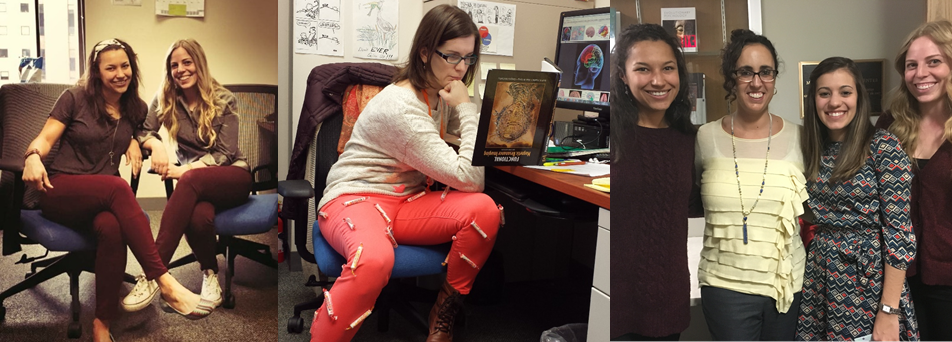The FEND Lab is committed to recruiting and providing ongoing support, training, and mentorship to underrepresented students at the undergraduate, post-baccalaureate, graduate, and post-doctoral levels.
Undergraduate Students

Undergraduate students at the University of Pittsburgh can get involved with the FEND lab through the Department of Psychology’s Directed Research program. Directed research students earn course credit in exchange for their assistance in the lab. Our application for undergraduate students opens March 1 and closes April 15th each Spring.
See the Pitt Department of Psychology website for more information:
- Families, Emotions, Neuroscience and Development Lab
- Steps to Securing a PSY1903 Directed Resarch Position
The FEND lab also offers federal work study positions to undergraduate students who qualify.
If you would like to be involved in the FEND lab as a directed research student or work study, please contact Lab Manager Sasha Hofman at sjh91@pitt.edu
Research Assistants:
The FEND lab is currently hiring a post-baccalaureate research assistant. Please email Dr. Silk at jss4@pitt.edu for more information.
Prospective Graduate Students:

Thank you for your interest in applying to be a graduate student in the Families, Emotions, Neuroscience and Development (FEND) Lab. I DO plan to interview students this year, and hopefully welcome a new student into the lab for the Fall of 2024. I receive too many emails from potential applicants to respond to each one personally, therefore I put together this material to help you learn about the program and decide if you want to apply. If you have a specific question after reviewing this material, feel free to email me. It is not necessary or encouraged to send an email to inform me that you will be applying--this does not provide any advantages in the application process.
I generally consider applications through the University of Pittsburgh’s Clinical/Developmental Joint Ph.D. Program. Details about the program, application process, funding and resources can be found here.
Admission to our program and my lab is highly competitive, so please make sure your interests are a good match before applying. I am looking to train students who are primarily interested in research careers, although students in our program do also receive high-quality clinical training. The lab studies the development of affective disorders in adolescents, such as anxiety, depression, and suicidality. Our research focuses on the intersection of neurobiological risk factors and social experiences, especially experiences with peers and social media as well as parents, and how these influence day-to-day emotional experience measured using ecological momentary assessment.
We are currently funded by the National Institute of Mental Health to study day-to-day fluctuations in emotional health among adolescent girls using ecological momentary assessment and passive sensing of social media use in a project called: “Neural sensitivity to social evaluation and daily online and in-person social experience with peers: Predicting fluctuations in suicidality, self-harm, and depressive symptoms in adolescent girls” (R01 MH124866). This study, co-directed by Dr. Cecile Ladouceur in the Psychiatry Department, examines how socially threatening and rewarding peer interactions—experienced online or in-person—contribute to real-time fluctuations in suicidality, self-harm, and depressive symptoms, independently and in interaction with neural vulnerabilities. We also have data available to analyze from a recently completed study (R01 MH103241: “Influence of Social Threat on Reward Function in At-Risk Adolescent Girls”), which was a prospective high-risk longitudinal neuroimaging/EMA study testing the role of altered responsiveness to social rewards in early adolescence as a mechanism that could contribute shared risk for social anxiety and depression among girls during later adolescence. Additionally, in a collaboration with Dr. Erika Forbes in Psychiatry (“Social-Affective Vulnerability to Suicidality among LGBTQ Young Adults: Proximal and Distal Factors”), we are using ecological momentary assessment, neuroimaging, and machine learning to examine how real-time social interactions (online and offline), and associated neural responses, predict increases in suicidal thoughts and behaviors among LGBTQ late adolescents and young adults.
With these projects in mind, I am open to taking students who are interested in adolescent development and anxiety, depression, and/or suicidality. In addition, students should have an interest in one or more of the topics/methods below. Please make sure to specify your interests in your application:
- social media use
- emotional reactivity and regulation
- peer acceptance and rejection
- parent-adolescent relationships
- affective neuroscience
- neuroimaging
- ecological momentary assessment
- eyetracking
I am also open to co-mentoring arrangements, with current students co-mentored by Dr. Sophia Choukas-Bradley with a focus on social media (but note Dr. Choukas-Bradley will not be able to co-mentor a student this year) and Dr. Cecile Ladouceur, with a focus on neuroimaging/affective neuroscience. Options may also be available for co-mentorship with Dr. Jamie Hanson. You can reach out to me discuss other potential co-mentoring arrangements.

What are you looking for in a prospective student?
Strong applicants to the FEND Lab are passionate about the topics described above and typically have a strong academic record, with prior coursework in psychology and at least one year of research experience. Independent research experience, such as completing a senior thesis, poster presentation, or publication is also valued. Most admitted students will have 1 or 2 years of post-baccalaureate research experience, although this is not a requirement. I look for students who show evidence of initiative, independence and leadership, productivity, and creativity. I value diversity, equity, and inclusion and strive to fill the lab with people who have diverse backgrounds and life experiences, as well as evidence of perseverance and resilience. The FEND lab is a close-knit and collaborative community and we are looking for new students who are friendly and enjoy working as part of the team and collaborating with other students and post-docs/faculty who have complementary interests. I also look for students who are strong writers and communicators. Please feel free to submit an independent writing sample to demonstrate your writing abilities. Please note that GRE scores are currently optional for the Clinical/Developmental Program at Pitt. Please feel free to submit your GREs if you feel they are a good reflection of your ability but if you do not submit GRE scores it will not hurt your chances of admission in any way.
How does the admission process work?
Given the typical number of applicants to my lab, I will not be able to meet individually with interested applicants prior to the review process. Although I enjoy speaking with prospective students, it wouldn't be possible for me to meet with all applicants to the lab or to review all applicants' materials in advance, and therefore this process maximizes equity and transparency, while also allowing me to focus on mentoring my current students. I will begin reviewing applications in mid-December. I will be asked to review applications for students who listed me as a potential mentor. Please list my name first if you wish to work with me, to ensure that your application comes to my attention. I use a holistic review process that includes reviewing personal statements, letters of recommendation, CVs, transcripts, and other submitted materials. Personal statements are especially valuable, so please make sure to give me a good sense of who you are and what you are interested in focusing on in graduate school. This is also an opportunity to showcase your creativity and writing skills. I also pay attention to any structural barriers or unique circumstances that applicants may choose to discuss in the personal statement. After conducting a holistic review of all applications, I will select a "long list" of candidates (usually the top 20 applicants) for first-round "unofficial" Zoom interviews with myself or a member of my lab, usually during the Winter Break. In early January, a smaller number of applicants will be invited for the official University of Pittsburgh interview day, where they will have the opportunity to meet with faculty and students from across the Department, which will be conducted virtually this year on January 26th and 27th. Students who receive offers will be invited to visit the University of Pittsburgh in person on February 23rd and 24th. Although I am the primary person reviewing the applications that list me as a potential mentor, the ultimate decision about whom to invite for official interview visits (and final admissions decisions) is made collectively by faculty in the specific graduate programs.
Below are some resources you may find useful in preparing your application:
- My colleague Mitch Prinstein recently updated his helpful guide, Mitch’s Uncensored Advice for Applying to Graduate School in Clinical Psychology.
- Mitch Prinstein also has a new APA YouTube series for prospective students. This series focuses on becoming a psychological scientist and applying to grad school, with the goal of providing info to prospective students and diversifying the field.
- Pitt grad student Savannah Roberts has organized a preparation program for prospective students.
- My Pitt colleague, clinical psychology professor Michael Sayette, co-authored this extremely helpful book: Insider's Guide to Graduate Programs in Clinical and Counseling Psychology: 2024/2025 Edition
Contact Information
The FEND Lab is located on the fourth floor of Sennott Square at 210 South Bouquet Street in Oakland.
If you have any additional questions about the FEND Lab, please contact us.

